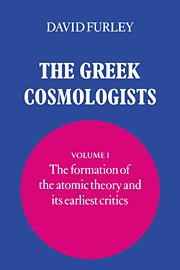Book contents
- Frontmatter
- Contents
- Preface
- 1 Two pictures of the world
- 2 The judgement of Socrates
- 3 The beginning in Miletus
- 4 Two philosophical critics: Heraclitus and Parmenides
- 5 Pythagoras, Parmenides, and later cosmology
- 6 Anaxagoras
- 7 Empedocles and the invention of elements
- 8 Later Eleatic critics
- 9 Leucippus and Democritus
- 10 The cosmos of the Atomists
- 11 The anthropology of the Atomists
- 12 Plato's criticisms of the materialists
- 13 Aristotle's criticisms of the materialists
- Bibliography
- Index of passages
- General index
4 - Two philosophical critics: Heraclitus and Parmenides
Published online by Cambridge University Press: 27 January 2010
- Frontmatter
- Contents
- Preface
- 1 Two pictures of the world
- 2 The judgement of Socrates
- 3 The beginning in Miletus
- 4 Two philosophical critics: Heraclitus and Parmenides
- 5 Pythagoras, Parmenides, and later cosmology
- 6 Anaxagoras
- 7 Empedocles and the invention of elements
- 8 Later Eleatic critics
- 9 Leucippus and Democritus
- 10 The cosmos of the Atomists
- 11 The anthropology of the Atomists
- 12 Plato's criticisms of the materialists
- 13 Aristotle's criticisms of the materialists
- Bibliography
- Index of passages
- General index
Summary
The value of logos
The course of the history of philosophy and science was utterly changed by these two men. Many would claim, in fact, that philosophy in the modern sense began with Parmenides – or at least that a historian of philosophy today must begin with Parmenides. Earlier writers are now represented by a few isolated phrases or sentences of their own words and some garbled second-hand reports; but by great good fortune – and the far-sighted wisdom of Simplicius, who understood the historical importance of being able to quote the original text, a thousand years after it was written – a substantial portion of Parmenides' argument survives, in his own poetic words. It is undeniably an argument and undeniably philosophical; and its importance can hardly be exaggerated. Often in history, and especially in the history of science, although each progressive step is credited to the account of a single person or group, it can be seen that if the advance had not been made then, it would inevitably have been made soon by someone else. In the case of Parmenides, this is not true. There is nothing quite like his argument: it seems startlingly original.
Nevertheless, there is a point in including Heraclitus with Parmenides in the same chapter, although they were separated physically from each other by the whole of the Greek world – Heraclitus lived in Ephesus, Parmenides in the South Italian town of Elea – and they wrote in different genres.
- Type
- Chapter
- Information
- The Greek Cosmologists , pp. 31 - 48Publisher: Cambridge University PressPrint publication year: 1987



